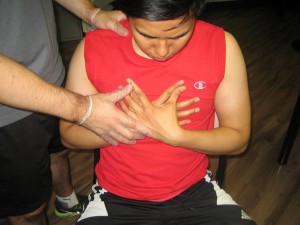Coronary heart disease refers to coronary artery disease which occurs once the blood vessels that go to the heart start to constrict. The narrowing typically occurs due to the deposit of plaque in the vessels, resulting to the lessening in the level of oxygenated blood that reaches the heart. A healthy diet as well as increasing the level of exercise can help prevent or reduce the formation of these plaques. It is important that you are familiar with the long term effects of coronary heart disease so that essential lifestyle changes can be made.
Unstable angina
The narrowing of the blood vessels will disrupt the proper flow of blood to the heart and this can lead to angina which is a type of chest pain. The chest will feel tight or have a burning sensation along with pain that can radiate into the left side of the neck or down to the left arm.

If an individual has stable angina, the individual will probable expect the times he/she will suffer the chest discomfort particularly after physical activity. As for unstable angina, this can manifest at any time without warning. Always remember that this type of chest discomfort can indicate an early sign of a heart attack. If the individual experiences unexplained chest pain or pain that could not be eased quickly, it is best to seek immediate medical care. If you want to learn the first aid measures to provide, click here.
Heart failure
For the proper pumping of blood all over the body, the blood vessels should provide adequate amount of blood in order to fill the heart. In case the constricted blood vessels limit the amount of blood reaching the heart, this will gradually damage the heart muscles and result to weak, ineffective pumping action which is a condition called as heart failure. The symptoms of heart failure include edema in the legs, ankles and feet and difficulty breathing. In some cases, the abdomen can also swell. If the individual experiences any of these symptoms, it is best to consult a doctor as soon as possible.
Heart failure cannot be cured but the doctor will offer suggestions to help prevent further damage and improve the heart function. The individual should eat a balanced, healthy diet that is rich in whole grains, fruits and vegetables as well as lean meat. The doctor will also recommend reducing the intake of salt in the diet since this can increase the build-up of fluid which can affect the functionality of the heart.
Heart attack
Long-term coronary heart disease can lead to a heart attack. This will result when the plaque that clogs up the heart completely blocks the flow of blood or severely limits the amount of blood that the heart receives. During a heart attack, the heart will not receive blood and this will cause permanent damage to the heart as well as resulting to death.
The indications of a heart attack include chest pain as well as pain that radiates to the arm or up to the neck and to the jaw. The individual will feel shortness of breath and weakness. If the individual experiences any of these symptoms, emergency assistance is required.
